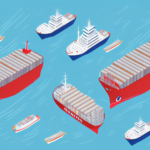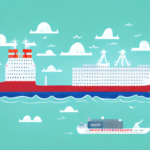The Top 10 Shipping Companies in the World
The global shipping industry has been a cornerstone of international trade for centuries, playing a pivotal role in the movement of goods and contributing significantly to the global economy. As of 2023, the top 10 shipping companies in the world continue to dominate the market, responsible for transporting millions of tons of cargo annually. This article provides an in-depth analysis of these leading shipping companies, examining their histories, financial performances, service offerings, environmental initiatives, challenges, and the impact of government policies.
Understanding the Shipping Industry
The shipping industry encompasses companies engaged in the transportation of goods and materials via waterways, utilizing a diverse array of vessels. It is a critical sector that connects nations and businesses, facilitating international trade across borders. The industry is highly complex, with various specialized vessels such as tanker ships for liquid cargo like oil and gas, and container ships for a wide range of consumer goods including electronics, clothing, and more.
One of the most pressing challenges the shipping industry faces is the impact of climate change. With increasing global emphasis on reducing carbon emissions, the industry is under immense pressure to adopt more sustainable practices. Companies are exploring alternative fuels such as biofuels and hydrogen, and investing in technologies that enhance vessel efficiency. Despite these challenges, the shipping industry remains indispensable to the global economy, ensuring the seamless movement of goods and materials worldwide.
History of Shipping Companies
The history of shipping dates back to ancient civilizations, with the Greeks and Egyptians establishing early maritime trade routes in the Mediterranean Sea. The expansion of international trade during the Middle Ages led to the formation of companies dedicated to ocean trading. The Industrial Revolution marked a significant turning point, introducing steamship technology and modern navigation systems, which paved the way for the first modern shipping companies in Europe during the early 19th century.
The 20th century witnessed exponential growth in the shipping sector, driven by global trade expansion and the advent of containerization. Containerization revolutionized the industry by enabling the efficient and cost-effective transportation of goods, leading to the rise of large shipping conglomerates that dominated the market. In recent decades, the industry has faced challenges such as overcapacity, fluctuating fuel costs, and heightened environmental scrutiny, prompting companies to innovate and adopt new technologies.
Today, shipping companies continue to evolve, focusing on sustainability, digitalization, and automation to address contemporary challenges and meet the demands of a dynamic global market.
Key Factors Determining Top Shipping Companies
Fleet Size and Composition
The size and diversity of a shipping company's fleet are critical indicators of its capacity and versatility. A larger fleet enables companies to service multiple routes and handle various types of cargo, enhancing their global reach and operational flexibility.
Geographical Coverage
Extensive geographical coverage allows shipping companies to tap into diverse markets and optimize their supply chains. Companies with a presence in key global ports can offer more reliable and timely services to their clients.
Financial Performance
Robust financial health ensures that shipping companies can invest in new technologies, expand their fleets, and weather economic downturns. Key financial metrics include revenue growth, profitability, and return on investment.
Service Offerings
Diversified service offerings, such as specialized cargo handling, logistics solutions, and value-added services like customs clearance and warehousing, set top shipping companies apart from their competitors.
Technological Innovation
Adoption of advanced technologies like automation, artificial intelligence, and blockchain enhances operational efficiency, reduces costs, and improves customer satisfaction.
Sustainability Practices
Commitment to environmental responsibility through the use of eco-friendly fuels, energy-efficient vessels, and waste reduction initiatives is increasingly important in defining top shipping companies.
Global Trade and the Shipping Industry
The shipping industry is the backbone of global trade, responsible for transporting over 90% of the world's merchandise according to the International Chamber of Shipping. In 2022, approximately 11 billion tons of cargo were moved by sea, highlighting the industry's critical role in connecting economies and facilitating the exchange of goods and services.
As global trade continues to grow, driven by emerging markets and increasing consumer demand, the shipping industry's importance is set to rise further. However, the sector faces significant challenges, including environmental concerns, geopolitical tensions, and disruptions from global events such as the COVID-19 pandemic. These factors necessitate adaptability and resilience from shipping companies to maintain their pivotal role in the global economy.
Technological Innovations in Shipping
Digitalization and Big Data Analytics
The integration of digital technologies and big data analytics has transformed the shipping industry. By leveraging vast amounts of data, shipping companies can optimize routes, enhance fuel efficiency, and predict maintenance needs, leading to significant cost savings and improved operational performance.
Autonomous Vessels
Autonomous ships, equipped with advanced navigation and control systems, are poised to revolutionize maritime transportation. These vessels promise increased safety, reduced labor costs, and enhanced efficiency by minimizing human error and streamlining operations.
Blockchain Technology
Blockchain offers secure and transparent transaction records, facilitating better coordination among stakeholders in the shipping supply chain. This technology enhances traceability, reduces fraud, and improves the overall reliability of shipping operations.
Green Technologies
In response to environmental regulations and sustainability goals, shipping companies are investing in green technologies such as wind-assisted propulsion, hydrogen fuel cells, and energy-efficient hull designs. These innovations help reduce carbon emissions and minimize the industry's environmental footprint.
Financial Performance of Leading Shipping Companies
The financial health of top shipping companies is a testament to their operational efficiency and market dominance. For instance, Maersk, one of the largest shipping companies globally, reported revenues exceeding $80 billion in 2022, reflecting robust growth despite industry volatility.
Similarly, Mitsubishi Corporation and MSC have demonstrated strong financial performance through strategic fleet expansions and market diversification. However, the industry is not without its challenges. Overcapacity, fluctuating fuel prices, and geopolitical tensions can significantly impact profitability. Effective financial management and strategic investments are crucial for maintaining competitive advantage and ensuring long-term sustainability.
Environmental Impact and Sustainability Initiatives
Emission Reduction
Shipping is a major contributor to global greenhouse gas emissions, accounting for approximately 2.5% of total global emissions. In response, leading shipping companies are committed to reducing their carbon footprint by adopting low-emission fuels, enhancing energy efficiency, and investing in carbon offset projects.
Ballast Water Management
The discharge of ballast water poses significant environmental risks by introducing invasive species into marine ecosystems. The International Maritime Organization has established regulations to manage ballast water effectively. Top shipping companies are investing in ballast water treatment systems to comply with these regulations and protect marine biodiversity.
Alternative Energy Sources
Exploring alternative energy sources such as biofuels, hydrogen, and wind-assisted propulsion is a key focus for sustainable shipping. Companies like Hapag-Lloyd and CMA CGM are pioneering the use of LNG and other clean fuels to power their fleets, significantly reducing emissions and enhancing environmental performance.
Challenges Faced by Top Shipping Companies
Piracy and Security Risks
Piracy remains a persistent threat in certain maritime regions, posing significant security risks to shipping operations. Top shipping companies implement comprehensive security measures, including onboard armed guards and advanced surveillance systems, to mitigate these risks and ensure the safety of their vessels and crew.
Port Congestion
Port congestion leads to delays, increased operational costs, and reduced efficiency. The COVID-19 pandemic exacerbated these issues, highlighting the need for infrastructure investments and streamlined port operations to handle growing trade volumes.
Regulatory Compliance
Adhering to diverse and evolving international regulations is a complex challenge for shipping companies. Compliance with environmental standards, safety protocols, and trade laws requires continuous monitoring and adaptation to regulatory changes.
Geopolitical Tensions
Geopolitical instability can disrupt shipping routes, increase transit times, and elevate operational risks. Shipping companies must navigate these tensions by diversifying their routes and maintaining flexibility in their operations to minimize the impact on their services.
Future Trends in the Shipping Industry
Autonomous and Smart Ships
The development of autonomous and smart ships is set to transform maritime transportation, enhancing safety, reducing operational costs, and increasing efficiency. These vessels will leverage artificial intelligence and machine learning to optimize navigation and maintenance processes.
Digital Supply Chains
Digitalization of supply chains through blockchain, IoT, and advanced data analytics will streamline operations, improve transparency, and enable real-time tracking of shipments, enhancing overall supply chain resilience.
Green Shipping Initiatives
Continued focus on sustainability will drive the adoption of green shipping initiatives, including the use of renewable energy sources, waste management practices, and eco-friendly vessel designs to reduce the environmental impact of shipping.
Expansion into Emerging Markets
Emerging markets in Africa, Asia, and South America offer significant growth opportunities for shipping companies. Expanding into these regions will require tailored solutions to address local logistics challenges and capitalize on increasing trade volumes.
Emerging Markets and Opportunities
Emerging markets present lucrative opportunities for top shipping companies seeking growth and diversification. Regions such as Africa, with its expanding infrastructure projects, Asia's burgeoning economies, and South America's rich natural resources offer vast potential for shipping services.
To capitalize on these opportunities, shipping companies must develop customized logistics solutions that address the unique needs of these markets. This includes investing in local port infrastructures, forming strategic partnerships, and adapting to regional regulatory environments.
Furthermore, tapping into the digital transformation trends in these markets can enhance operational efficiency and customer satisfaction, positioning shipping companies as key players in regional and global trade networks.
Case Studies of Successful Strategies
Maersk's Digital Transformation
Maersk has successfully implemented a comprehensive digital transformation strategy, integrating advanced analytics, AI, and blockchain to optimize its operations. This has resulted in improved route planning, enhanced cargo tracking, and streamlined supply chain management, reinforcing Maersk's position as a leader in the shipping industry.
MSC's Sustainability Initiatives
MSC has committed to reducing its environmental impact by investing in energy-efficient vessels and adopting alternative fuels. Their initiatives include the deployment of LNG-powered ships and participation in carbon offset programs, demonstrating a strong commitment to sustainability.
CMA CGM's Global Expansion
CMA CGM has expanded its global footprint through strategic acquisitions and partnerships, enabling it to offer comprehensive shipping services across diverse markets. This expansion strategy has enhanced its market presence and operational capabilities, solidifying its status among the top shipping companies.
The Role of Government Policies
Government policies and international regulations play a crucial role in shaping the shipping industry. Policies related to trade agreements, environmental standards, and maritime safety influence the operational strategies and profitability of shipping companies.
For instance, regulations imposed by the International Maritime Organization on sulfur emissions have prompted shipping companies to adopt cleaner fuels and invest in emission-reducing technologies. Additionally, trade policies and tariffs can impact shipping volumes and route selections, necessitating adaptability from shipping companies to navigate changing regulatory landscapes.
Government support in the form of subsidies, grants, and infrastructure investments can also facilitate the growth and modernization of shipping fleets, contributing to the overall advancement of the industry.
Insights from Industry Experts
Industry experts emphasize the importance of innovation and sustainability in driving the future growth of shipping companies. According to a report by the Boston Consulting Group, digitalization and sustainable practices are key factors that will determine the competitive edge of shipping companies in the coming years.
Experts also highlight the necessity for shipping companies to build resilient supply chains capable of withstanding global disruptions. Investments in flexible logistics solutions, diversified routes, and advanced technologies are essential for maintaining operational continuity and meeting evolving customer demands.
Furthermore, collaboration between industry stakeholders, including shipping companies, port authorities, and technology providers, is vital for fostering innovation and addressing common challenges such as environmental sustainability and cybersecurity.
Conclusion
The top 10 shipping companies in the world are pivotal to the functioning of the global economy, enabling the seamless movement of goods and materials across international borders. These companies navigate a complex landscape characterized by technological advancements, environmental challenges, and evolving regulatory frameworks. By embracing innovation, committing to sustainability, and strategically expanding into emerging markets, the leading shipping companies are well-positioned to drive the future of maritime transportation.
As the industry continues to evolve, the ability to adapt to changing market conditions and regulatory requirements will be crucial for maintaining competitiveness and ensuring long-term success. The ongoing efforts to enhance operational efficiency, reduce environmental impact, and capitalize on new opportunities will shape the trajectory of the shipping industry in the years to come.






















